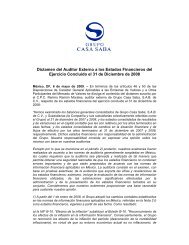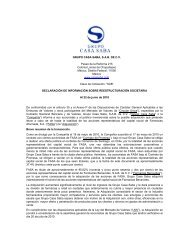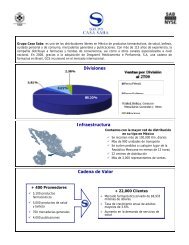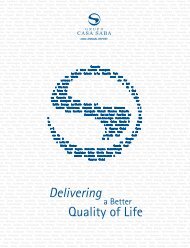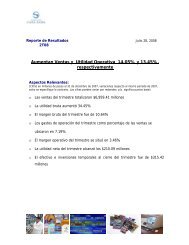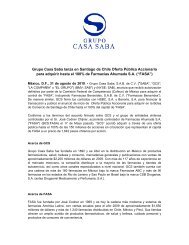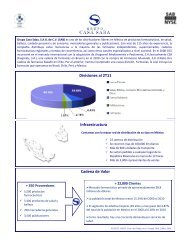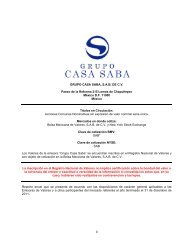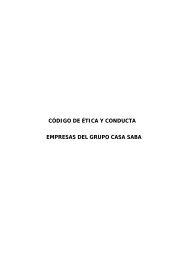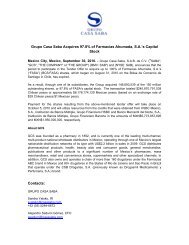FORM 20-F Grupo Casa Saba, S.A.B. de C.V.
FORM 20-F Grupo Casa Saba, S.A.B. de C.V.
FORM 20-F Grupo Casa Saba, S.A.B. de C.V.
Create successful ePaper yourself
Turn your PDF publications into a flip-book with our unique Google optimized e-Paper software.
Table of Contents<br />
We anticipate that any cash distributions on the ADSs and Ordinary Shares will be ma<strong>de</strong> in Pesos, and any divi<strong>de</strong>nds so paid generally will be inclu<strong>de</strong>d in a U.S.<br />
Hol<strong>de</strong>r’s gross income in a U.S. Dollar amount calculated by reference to the exchange rate in effect on the day you or the Depositary, as applicable, receives the divi<strong>de</strong>nd. It is expected<br />
that the ADS Depositary will, in the ordinary course, convert Pesos received by it as distributions into U.S. Dollars. To the extent that the Depositary does not convert the Pesos into<br />
U.S. Dollars at the time that such U.S. Hol<strong>de</strong>r is required to take the distribution into gross income for U.S. Fe<strong>de</strong>ral income tax purposes, such U.S. Hol<strong>de</strong>r may recognize foreign<br />
exchange gain or loss, taxable as ordinary income or loss, on the later conversion of the Pesos into U.S. Dollars. The gain or loss recognized will generally be based upon the difference<br />
between the exchange rate in effect when the Pesos are actually converted and the “spot” exchange rate in effect at the time the distribution is taken into account. Any foreign currency<br />
gain or loss will generally be treated as U.S.-source income or loss for U.S. foreign tax credit limitation purposes. U.S. Hol<strong>de</strong>rs should consult their own tax advisors regarding the<br />
treatment of foreign currency gain or loss, if any, on any Pesos received which are converted to U.S. dollars on a date subsequent to receipt.<br />
Divi<strong>de</strong>nds paid by us will generally be treated as foreign source income for U.S. foreign tax credit limitation purposes. Subject to certain limitations, U.S. Hol<strong>de</strong>rs may<br />
elect to claim a foreign tax credit against their U.S. Fe<strong>de</strong>ral income tax liability for foreign tax withheld (if any) from divi<strong>de</strong>nds received in respect of the ADSs or Ordinary Shares, as<br />
applicable. The limitation on foreign taxes eligible for credit is calculated separately with respect to specific classes of income. For this purpose, divi<strong>de</strong>nds paid in respect of our ADSs<br />
or Ordinary Shares, as applicable, generally will be “passive income”, and therefore any U.S. Fe<strong>de</strong>ral income tax imposed on these divi<strong>de</strong>nds cannot be offset by excess foreign tax<br />
credits that such U.S. Hol<strong>de</strong>rs may have from foreign source income not qualifying as passive income. U.S. Hol<strong>de</strong>rs who do not elect to claim a foreign tax credit may instead claim a<br />
<strong>de</strong>duction for foreign tax withheld (if any).<br />
Distributions of Ordinary Shares and ADSs to U.S. Hol<strong>de</strong>rs with respect to their holdings of Ordinary Shares and ADSs, as the case may be (such previously held<br />
ADSs or Ordinary Shares being “Old Stock”), that are prorata with respect to their holdings of Old Stock (and whenever a hol<strong>de</strong>r may not elect to receive cash distributions in lieu of<br />
distributions of ADSs or Ordinary Shares) will generally not be subject to U.S. Fe<strong>de</strong>ral income tax (except with respect to cash received in lieu of fractional Ordinary Shares and ADSs, if<br />
any). The basis of the Ordinary Shares and ADSs so received will be <strong>de</strong>termined by allocating the U.S. Hol<strong>de</strong>r’s adjusted basis in the Old Stock between the Old Stock and the Ordinary<br />
Shares and ADSs so received.<br />
Taxation of Sale or Other Disposition. Unless a non-recognition provision applies, a U.S. Hol<strong>de</strong>r will recognize capital gain or loss upon a sale or other disposition of<br />
ADSs or Ordinary Shares in an amount equal to the difference between the amount realized on their disposition and such U.S. Hol<strong>de</strong>r’s basis in the ADSs or Ordinary Shares. Un<strong>de</strong>r<br />
current law, capital gains realized by corporate and individual taxpayers are generally subject to U.S. Fe<strong>de</strong>ral income taxes at the same rate as ordinary income, except that long-term<br />
capital gains (i.e., where the U.S. Hol<strong>de</strong>r has a holding period greater than one year) realized by individuals, trusts and estates are subject to U.S. Fe<strong>de</strong>ral income taxes at a reduced rate.<br />
Certain limitations exist on the <strong>de</strong>ductibility of capital losses by both corporate and individual taxpayers. Capital gains and losses on the sale or other disposition by a U.S. Hol<strong>de</strong>r of<br />
ADSs or Ordinary Shares generally should constitute gains or losses from U.S. source income.<br />
For cash basis U.S. Hol<strong>de</strong>rs who receive foreign currency in connection with a sale or other taxable disposition of ADSs or Ordinary Shares, as applicable, the amount<br />
realized will be based on the U.S. Dollar value of the foreign currency received with respect to such ADSs or Ordinary Shares as <strong>de</strong>termined on the settlement date of such sale or other<br />
taxable disposition.<br />
Accrual basis U.S. Hol<strong>de</strong>rs may elect the same treatment required of cash basis taxpayers with respect to a sale or other taxable disposition of ADSs or Ordinary<br />
Shares, as applicable, provi<strong>de</strong>d that the election is applied consistently from year to year. Such election may not be changed without the consent of the U.S. Internal Revenue Service.<br />
Accrual basis U.S. Hol<strong>de</strong>rs who do not elect to be treated as cash basis taxpayers (pursuant to the U.S. Treasury Regulations applicable to foreign currency transactions) for this<br />
purpose may have a foreign currency gain or loss for U.S. Fe<strong>de</strong>ral income tax purposes because of differences between the U.S. Dollar value of the foreign currency received prevailing<br />
on the date of the sale or other taxable disposition of ADSs or Ordinary Shares, as applicable, and the date of payment. Any such foreign currency gain or loss generally will constitute<br />
a gain or loss from sources within the U.S. and generally will be treated as ordinary income or loss and would be in addition to gain or loss, if any, recognized on the sale or other taxable<br />
disposition of ADS or Ordinary Shares, as applicable.<br />
116



